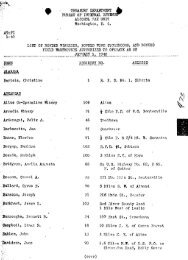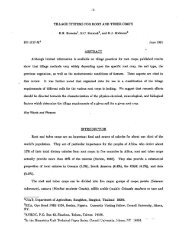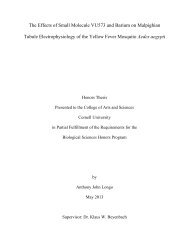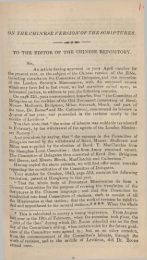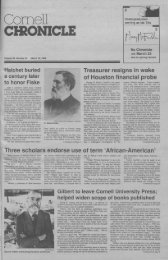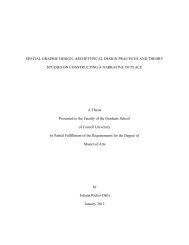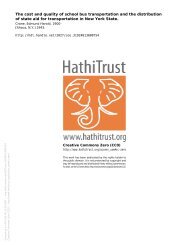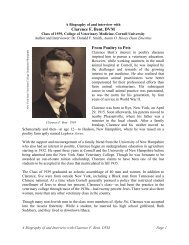1/1 - eCommons@Cornell - Cornell University
1/1 - eCommons@Cornell - Cornell University
1/1 - eCommons@Cornell - Cornell University
- No tags were found...
You also want an ePaper? Increase the reach of your titles
YUMPU automatically turns print PDFs into web optimized ePapers that Google loves.
f<br />
believe that all the media attention<br />
has distorted the facts, making it<br />
appear as if a majority of Americans<br />
are worried. But depending on who<br />
you talk to or which study you read,<br />
consumers are either indifferent and<br />
that bST has "no benefits for consumers<br />
and may pose some risks."<br />
CPI claims that there is an increased<br />
incidence of an udder infection called<br />
mastitis in bST-treated cows. This<br />
leads to lower quality milk "contain-<br />
workshops and evaluations of bST,<br />
and is frequently cited in the studies<br />
that are used to confirm the safety of<br />
the hormone. His research has been<br />
supported by Monsanto, Upjohn,<br />
American Cyanamid, the U.S. De-<br />
Even ice cream empire Ben & Jerry's has opposed bSTfrom<br />
the beginning, claiming that the drug would further industrialize<br />
the farm and run family farmers out of business.<br />
willing to drink milk from treated<br />
cows or terrified and prepared to give<br />
up dairy products forever.<br />
"The public is really minimally<br />
concerned," says Hardy of Boyce<br />
Thompson. He cites a study conducted<br />
by the <strong>University</strong> of North<br />
Carolina that questioned more than<br />
1,000 people and found that more<br />
than 80 percent had no concern about<br />
bST. Hardy thinks that the press has<br />
given a distorted view of the issue<br />
by focusing on highly vocal "organizations<br />
that have an objective to be<br />
anti-biotech."<br />
Two such groups, the Foundation<br />
on Economic Trends (FET) and its<br />
subsidiary The Pure Food Campaign<br />
(PFC), say that thousands of consumers<br />
fear the government is not telling<br />
the truth about bST. It has been<br />
fighting the product for years and has<br />
organized protests in major cities<br />
that feature milk being dumped into<br />
gutters or poured into milk cans<br />
marked "toxic milk." The FET estimates<br />
that it has about 18,000 consumer<br />
supporters in the United<br />
States. The group also has enlisted<br />
some of the country's top chefs for a<br />
boycott of all gene-altered foods.<br />
When the movie Jurassic Park<br />
opened last summer, PFC distributed<br />
flyers about biotech produce,<br />
featuring a picture of Tyrannosaurus<br />
Rex wheeling a shopping cart. The<br />
flyer asked "Is Jurassic Supermarket<br />
next?"<br />
The Consumer Policy Institute<br />
(CPI), the research arm of the Consumers<br />
Union, of Yonkers, NY, says<br />
ing more pus and bacteria" than milk<br />
from untreated cows, says CPI scientist<br />
Michael Hansen. He disputes<br />
the assertion that milk from treated<br />
cows is the same as that of untreated<br />
ones, and says that milk from animals<br />
that receive the hormone has higher<br />
levels of a secondary hormone called<br />
IGF-1, a substance that some scientists<br />
say may cause cancer.<br />
There has been a call for labeling<br />
of products that contain milk from<br />
cows treated with BGH. Since early<br />
February, when bST went on the<br />
market, several dairies have tried to<br />
label their products as coming from<br />
cows that were not treated with the<br />
hormone. Even ice cream maker Ben<br />
& Jerry's has opposed bST from the<br />
beginning, claiming that the drug<br />
would further industrialize the farm<br />
and run family farmers out of business.<br />
The company has prepared 8<br />
million lid labels that declare the milk<br />
and cream used in its products come<br />
from cows receiving no supplemental<br />
bST.<br />
A bemused Dale Bauman has<br />
watched the media debate with an<br />
increasing sense of wonder. "It's<br />
fascinating to me," he says. "In science,<br />
there are a lot of areas where<br />
knowledgeable people disagree.<br />
Safety of food products from bSTtreated<br />
cows is not one of them."<br />
Bauman was the first person to<br />
recognize the power of the hormone<br />
in increasing milk output. He is an<br />
author of one of the background research<br />
reports the Federal Office of<br />
Technology Assessment used in its<br />
JUNE 1994<br />
25<br />
partment of Agriculture, the National<br />
Institutes of Health, the National<br />
Science Foundation and several dairy<br />
cooperatives.<br />
Raised on a Michigan dairy farm,<br />
Bauman put bST on the national<br />
agenda in the late 1970s when he<br />
started researching why some animals<br />
use nutrients more efficiently<br />
than others. He was looking into this<br />
question at the same time molecular<br />
biologists were figuring out how to<br />
make exact duplicates of genes (a<br />
process called cloning) and inserting<br />
them into the genetic material of<br />
other organisms in the first gene<br />
splicing experiments.<br />
"We had a concept, we had an<br />
idea, all we needed was a way to test<br />
it," Bauman says. His first experiments<br />
were conducted with samples<br />
of the bovine hormone that the National<br />
Institutes of Health had extracted<br />
from pituitary glands of<br />
slaughtered animals, and made available<br />
to scientists all over the world.<br />
In the early 1980s, the thenfledgling<br />
biotechnology company<br />
Genentech fished the gene for bST<br />
out of cow DNA and genetically engineered<br />
a strain of E. coli bacteria<br />
to produce the hormone. Once the<br />
gene was inserted in the bacteria,<br />
large quantities of bST could be made<br />
easily through fermentation and purification<br />
techniques. "One of the first<br />
recombinant proteins made was bovine<br />
somatotropin," says Bauman.<br />
By late 1981, a collaboration between<br />
Genentech and Monsanto was<br />
able to supply Bauman with some of



